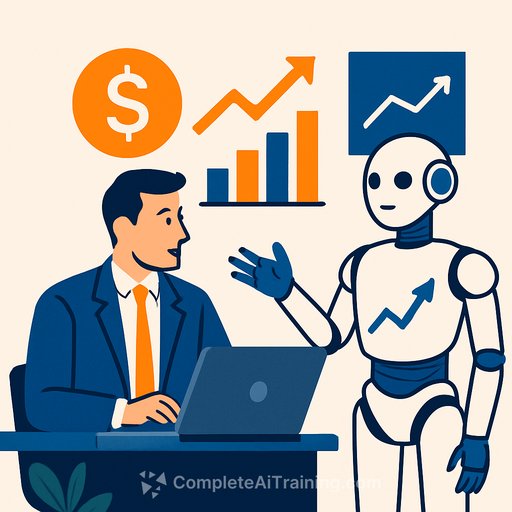Will AI Replace Finance Jobs in New Zealand? What To Do in 2025
Last updated: September 13, 2025
TL;DR: AI won't wipe out finance jobs in NZ by 2025. About 82% of organisations use AI, 93% see productivity gains, and only ~7% report direct job losses. Your edge: promptcraft, workflow design, and governance.
Table of Contents
- AI adoption and productivity in New Zealand finance
- How AI is changing finance roles
- Replacement vs augmentation
- Jobs most exposed vs resilient
- Skills to build now
- Practical steps and training pathways
- Employer and government supports
- NZ finance case studies
- A 12-month plan for finance workers
- Conclusion
- FAQ
AI adoption and productivity in New Zealand finance
AI is already standard practice. Surveys in 2025 show ~82% of NZ organisations use AI and 93% report productivity gains, while only about 7% report direct job losses. That signals augmentation, not mass layoffs.
On the ground, think Xero-style bank feeds, auto-coding, and reconciliation that remove repetitive work. Momentum Consulting reported ~15% of an FTE freed after deploying AI. The big blockers now are skills, governance, and trust-solve those and the gains stick.
How AI is changing finance roles
Manual tasks are shrinking; judgment work is growing. Bookkeeping, data entry, and first-line queries are getting automated. Accountants and analysts are spending more time on forecasting, budgeting, and client advice.
Xero's NZ analysis estimates faster digital adoption could add NZ$8.6B to GDP in 2025. The upside is real for teams that adopt tools and move up the value chain.
Replacement vs augmentation
This isn't a cliff; it's a shift. Adoption sits near 82% with strong efficiency results, and direct job cuts remain limited. Most finance pros now use generative AI daily, and a large majority consider AI skills career-critical.
Larger enterprises with standardised processes may consolidate roles. The pace of capability is accelerating, so the window to reskill is short. The move: use AI to do the grunt work; you keep the judgment, controls, and client conversations.
Jobs most exposed vs resilient
- Most exposed: bookkeeping, invoice processing, AP/AR, routine reconciliations, first-line customer service, and standardised reporting.
- More resilient: advisory, governance, audit oversight, model validation, controls testing, and client storytelling.
Simple rule: if a task is rules-based and data-heavy, it's exposed. If it needs context, discretion, or trust, it's safer.
Skills to build now
- Data literacy: exporting, validating, and summarising operational data; building board-ready summaries.
- Data storytelling and BI: turn rows into decisions with clear charts and narratives.
- AI literacy and promptcraft: automate reconciliations, draft standard reports, and improve accuracy with strong prompts.
- Governance and privacy: validation methods, controls, and policy; human-in-the-loop checks.
Think: fewer keystrokes, more judgment. Your goal is a clean, reliable answer to the CFO's question-fast.
Practical steps and training pathways
Use short, stackable learning to stay employable and visible. NZQA-listed micro-credentials (5-40 credits) are a fast way to add job-ready skills and show them on your Record of Achievement.
- AI Essentials for Work (bootcamp): 15 weeks. You learn AI at Work: Foundations, Writing AI Prompts, and Job-Based Practical AI Skills. Early bird NZ$3,582; NZ$3,942 after; 18-month payments available.
- Compliance micro-credentials: AML/CFT (Level 4, 8 credits), Consumer Credit (Level 5, 17 credits), Compliance Officer (Level 5, 5 credits). Layer governance on top of AI workflows.
If you want curated options by role or skills, see these collections:
Employer and government supports
Policy is moving. The New Zealand AI Strategy (2025) and MBIE's guidance give principles-based direction anchored in existing law (privacy, consumer protection, director duties). That lowers risk for adoption and training.
Useful reference: MBIE Responsible AI guidance. For economic upside from digital tools, see Xero's report: Economic benefits of digital tools.
NZ finance case studies
Cloud workflows cut busywork and open advisory time. Firms that automate bank feeds, POS sync, and receipt capture turn day-long cleanup into minutes. Reported outcomes include practice efficiency gains north of 30% and hundreds of hours reclaimed per year.
Pattern to copy: move to cloud, automate reconciliations, standardise data exports, then use AI to draft outputs you review and finalise.
A 12-month plan for finance workers
- Month 0-1: Run a 30-day readiness check. Map use cases (reconciliations, late-payment chasing), quantify manual hours, and get an approved roadmap.
- Month 2-3: Pilot two quick wins: bank recon automation and a late-payment prediction. Lock in governance and human-in-the-loop checks. Measure hours saved and error rates.
- Month 4-9: Scale proven modules, add real-time dashboards, invest in one NZQA-style micro-credential, and set up monitoring to prevent model drift.
- Month 10-12: Adopt agentic features that lift advisory capacity. Publish wins, and set a 3-year plan tied to KPIs.
Conclusion
AI in NZ finance is about doing more of the right work-fewer rote tasks, more judgment and advice. Adoption is high, efficiency gains are clear, and direct displacement remains limited.
Protect your role by building AI workflows, promptcraft, and governance. Short, applied learning gets you there fast, and employer support plus national guidance reduces risk.
Key NZ Indicators (2025)
- Organisations using AI: ~82%
- Businesses reporting productivity gains: ~93%
- Companies reporting AI replaced workers: ~7%
Frequently Asked Questions
Will AI replace finance jobs in New Zealand in 2025?
No. Firms report strong productivity gains with limited direct job loss. Expect automation of repetitive tasks and a shift toward forecasting, advisory, and governance. Treat AI as augmentation and build workflow and oversight skills.
Which finance roles are most exposed-and which are resilient?
Most exposed: bookkeeping, invoice processing, AP/AR, routine reconciliations, and first-line customer service. More resilient: advisory, governance, audit oversight, model validation, and data storytelling.
What skills and training should I prioritise?
Data literacy, data storytelling, AI literacy and promptcraft, and governance/privacy. Use NZQA micro-credentials and short courses you can apply on the job. Push for employer-backed training and human-in-the-loop controls.
What is the "AI Essentials for Work" bootcamp?
A 15-week programme focused on workplace AI skills: AI at Work (Foundations), Writing AI Prompts, and Job-Based Practical AI Skills. Pricing: Early Bird NZ$3,582; NZ$3,942 after; 18-month payment plan available.
What should finance teams do in the next 12 months?
Run a 30-day readiness check, pilot quick-win automations with governance, scale validated modules, complete one short credential, and deploy agentic features that expand advisory output. Track hours saved, error reduction, and growth in advisory time.
Your membership also unlocks:






